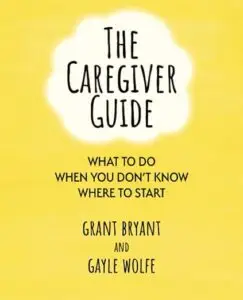
The Caregiver Guide
What to Do When You Don’t Know Where to Start
Grant Bryant & Gayle Wolfe
Self-published (2023)
- Emotional, Social
- Book, Premium Content, Resource Summary
Key Takeaways
- Start with a Plan – Even If It’s Basic. Simple pre-hospital checklists and role-clarifying talks reduce panic when a health crisis hits.
- Organize the Paper Trail Early. Medication logs, contact sheets, and bill trackers keep vital info at your fingertips, lowering stress fog during FND flares.
- Protect the Caregiver, Too. Regular “stress check-ins” and the “oxygen-mask” reminder encourage rest, boundaries, and shared duties.
- Ask the Right Questions. Ready-made prompts for doctors and insurers help you advocate confidently, especially when FND care plans shift often.
Click to read full summary
The Essentials
When a loved one’s health suddenly changes, caregiving can feel like stepping onto a moving treadmill. Grant Bryant learned this firsthand after his wife’s unexpected hospitalization. In plain, supportive language, he and co-author Gayle Wolfe break caregiving down into six stages—from pre-hospital planning to long-term care—so readers always know the very next step.
For families living with Functional Neurological Disorder, where episodes can trigger urgent hospital visits and evolving treatment plans, that step-by-step roadmap is gold. The book’s checklists, fill-in tables, and scenario prompts free up mental energy, letting you focus on safety, symptom tracking, and emotional connection instead of paperwork scavenger hunts.
Why This Matters for FND
Caregivers in the FND community often juggle unpredictable functional seizures, mobility changes, and doctor skepticism—all while managing their own worry and fatigue. The Caregiver Guide offers tools tailor-made for those realities: quick-reference medication lists for frequent drug adjustments, stress scales to spot burnout before it sidelines you, and conversation starters for hard-to-explain conditions like FND. These features align with Fit + Function’s mission to turn complex care into practical, everyday support.
Resource Qualities
Applicability:
Accessibility:
Evidence-Based:
Practical Value:
Practical Applications
For Individuals with FND
Low-Energy Days
- Keep a “Top 5 Questions for Today’s Appointment” list in your phone; glance at it before every visit.
Building Long-Term Wellness
- Use a medication tracker to notice patterns between dose changes and symptom shifts.
For Individuals with FND
Supporting Your Loved One
- Offer to jot answers while the patient speaks with clinicians, so they can focus on conversation instead of note-taking fatigue.
Caring for Yourself
- Schedule a weekly “paperwork power hour” to update bills, contacts, and care notes, preventing backlog burnout.
When This is Most Helpful
- Newly Diagnosed: sets up systems before FND care becomes complex.
- During Frequent Hospitalizations: provides ready-made questions and contact logs.
- For Long-Term Care Planners: outlines financial and respite-care considerations early.
This summary is provided for informational purposes only and does not constitute medical, financial, or legal advice. It is not intended to replace professional consultation or treatment. Always consult qualified providers regarding your specific circumstances, symptoms, or questions.
